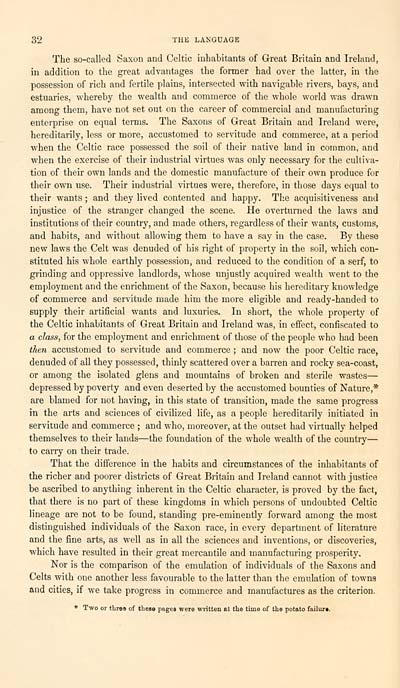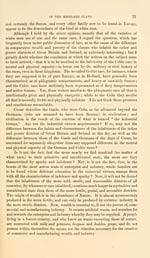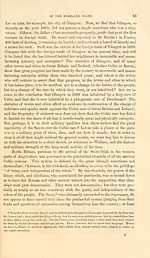Download files
Complete book:
Individual page:
Thumbnail gallery: Grid view | List view

32 THE LANGUAGE
The so-called Saxon and Celtic inhabitants of Great Britain and Ireland,
in addition to the great advantages the former had over the latter, in the
possession of rich and fertile plains, intersected with navigable rivers, bays, and
estuaries, whereby the wealth and commerce of the whole world was drawn
among them, have not set out on the career of commercial and manufacturing
enterprise on equal terms. The Saxons of Great Britain and Ireland were,
hereditarily, less or more, accustomed to servitude and commerce, at a period
when the Celtic race possessed the soil of their native land in common, and
when the exercise of their industrial virtues was only necessary for the cultiva-
tion of their own lands and the domestic manufacture of their own produce for
their own use. Their industrial virtues were, therefore, in those days equal to
their wants ; and they lived contented and happy. The acquisitiveness and
injustice of the stranger changed the scene. He overturned the laws and
institutions of their country, and made others, regardless of their wants, customs,
and habits, and without allowing them to have a say in the case. By these
new laws the Celt was denuded of his right of property in the soil, which con-
stituted his whole earthly possession, and reduced to the condition of a serf, to
grinding and oppressive landlords, whose unjustly acquired wealth went to the
employment and the enrichment of the Saxon, because his hereditary knowledge
of commerce and servitude made him the more eligible and ready-handed to
supply their artificial wants and luxuries. In short, the whole property of
the Celtic inhabitants of Great Britain and Ireland was, in effect, confiscated to
a class, for the employment and enrichment of those of the people who had been
then accustomed to servitude and commerce ; and now the poor Celtic race,
denuded of all they possessed, thinly scattered over a barren and rocky sea-coast,
or among the isolated glens and mountains of broken and sterile wastes —
depressed by poverty and even deserted by the accustomed bounties of Nature,*
are blamed for not having, in this state of transition, made the same progress
in the arts and sciences of civilized life, as a people hereditarily initiated in
servitude and commerce ; and who, moreover, at the outset had virtually helped
themselves to their lands — the foundation of the whole wealth of the country —
to carry on their trade.
That the difi"erence in the habits and circumstances of the inhabitants of
the richer and poorer districts of Great Britain and Ireland cannot with justice
be ascribed to anything inherent in the Celtic character, is proved by the fact,
that there is no part of these kingdoms in which persons of undoubted Celtic
lineage are not to be found, standing pre-eminently forward among the most
distinguished individuals of the Saxon race, in every department of Hterature
and the fine arts, as well as in all the sciences and inventions, or discoveries,
which have resulted in their great mercantile and manufacturing prosperity.
Nor is the comparison of the emulation of individuals of the Saxons and
Celts with one another less favourable to the latter than the emulation of towns
and cities, if we take progress in commerce and manufactures as the criterion.
* Two or tljrea of these pages were written at the time of the potato failur*.
The so-called Saxon and Celtic inhabitants of Great Britain and Ireland,
in addition to the great advantages the former had over the latter, in the
possession of rich and fertile plains, intersected with navigable rivers, bays, and
estuaries, whereby the wealth and commerce of the whole world was drawn
among them, have not set out on the career of commercial and manufacturing
enterprise on equal terms. The Saxons of Great Britain and Ireland were,
hereditarily, less or more, accustomed to servitude and commerce, at a period
when the Celtic race possessed the soil of their native land in common, and
when the exercise of their industrial virtues was only necessary for the cultiva-
tion of their own lands and the domestic manufacture of their own produce for
their own use. Their industrial virtues were, therefore, in those days equal to
their wants ; and they lived contented and happy. The acquisitiveness and
injustice of the stranger changed the scene. He overturned the laws and
institutions of their country, and made others, regardless of their wants, customs,
and habits, and without allowing them to have a say in the case. By these
new laws the Celt was denuded of his right of property in the soil, which con-
stituted his whole earthly possession, and reduced to the condition of a serf, to
grinding and oppressive landlords, whose unjustly acquired wealth went to the
employment and the enrichment of the Saxon, because his hereditary knowledge
of commerce and servitude made him the more eligible and ready-handed to
supply their artificial wants and luxuries. In short, the whole property of
the Celtic inhabitants of Great Britain and Ireland was, in effect, confiscated to
a class, for the employment and enrichment of those of the people who had been
then accustomed to servitude and commerce ; and now the poor Celtic race,
denuded of all they possessed, thinly scattered over a barren and rocky sea-coast,
or among the isolated glens and mountains of broken and sterile wastes —
depressed by poverty and even deserted by the accustomed bounties of Nature,*
are blamed for not having, in this state of transition, made the same progress
in the arts and sciences of civilized life, as a people hereditarily initiated in
servitude and commerce ; and who, moreover, at the outset had virtually helped
themselves to their lands — the foundation of the whole wealth of the country —
to carry on their trade.
That the difi"erence in the habits and circumstances of the inhabitants of
the richer and poorer districts of Great Britain and Ireland cannot with justice
be ascribed to anything inherent in the Celtic character, is proved by the fact,
that there is no part of these kingdoms in which persons of undoubted Celtic
lineage are not to be found, standing pre-eminently forward among the most
distinguished individuals of the Saxon race, in every department of Hterature
and the fine arts, as well as in all the sciences and inventions, or discoveries,
which have resulted in their great mercantile and manufacturing prosperity.
Nor is the comparison of the emulation of individuals of the Saxons and
Celts with one another less favourable to the latter than the emulation of towns
and cities, if we take progress in commerce and manufactures as the criterion.
* Two or tljrea of these pages were written at the time of the potato failur*.
Set display mode to: Large image | Transcription
Images and transcriptions on this page, including medium image downloads, may be used under the Creative Commons Attribution 4.0 International Licence unless otherwise stated. ![]()
| Early Gaelic Book Collections > Blair Collection > Treatise on the language, poetry, and music of the Highland clans > (44) |
|---|
| Permanent URL | https://digital.nls.uk/76236887 |
|---|
| Description | A selection of books from a collection of more than 500 titles, mostly on religious and literary topics. Also includes some material dealing with other Celtic languages and societies. Collection created towards the end of the 19th century by Lady Evelyn Stewart Murray. |
|---|
| Description | Selected items from five 'Special and Named Printed Collections'. Includes books in Gaelic and other Celtic languages, works about the Gaels, their languages, literature, culture and history. |
|---|

